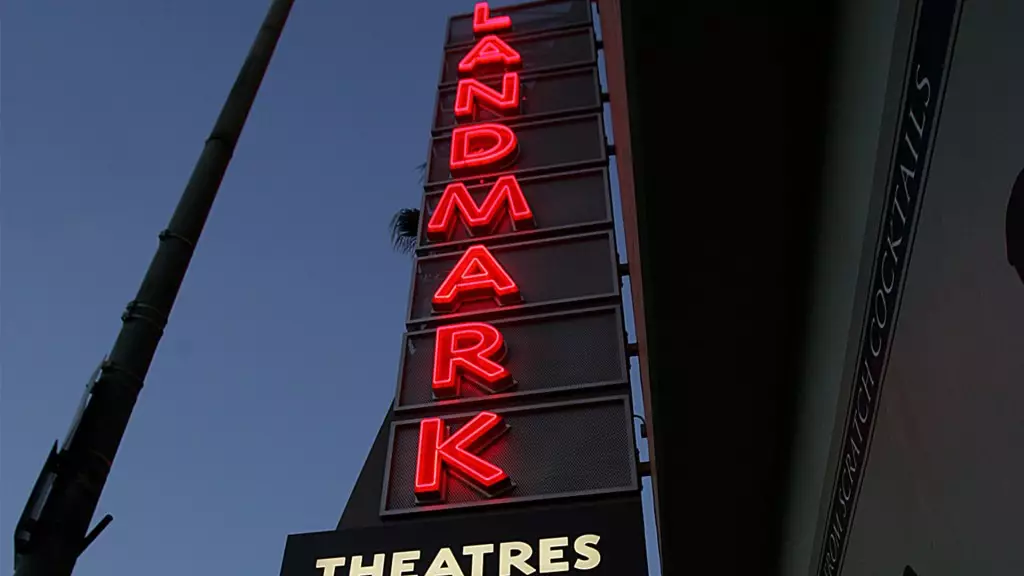The film exhibition industry has undergone a seismic transformation, particularly highlighted by Landmark Theatres’ recent struggles. Owned by Charles Cohen, Landmark has faced severe declines in value, reportedly losing hundreds of millions of dollars due to the intersecting crises of the COVID-19 pandemic, rising interest rates, and strikes within Hollywood. This unfortunate confluence of events is not just a tale of bad luck but serves as a reflection of vulnerabilities in the theatrical exhibition landscape.
The ongoing litigation between Cohen and his lender, Fortress Credit Corp., encapsulates the severity of the situation. According to Cohen’s deposition, which was presented in a New York State Supreme Court, he acknowledged a significant default on a loan, necessitating the auction of Landmark’s assets to repay debts. His predicament underscores not just personal financial risk, as he faces a staggering $187 million personal loan guarantee pending the outcome of an impending auction slated for November 8, but also highlights a system under extreme pressure.
Cohen’s outlook, as conveyed through his deposition, paints a grim picture for Landmark. With businesses often experiencing swings in profitability influenced by external factors, Cohen revealed that Landmark has been grappling with a “net loss” that he could attribute to multiple sources. He hinted at a distressing operational reality, mentioning that the company reported losses amounting to over $14 million in net revenue.
The interplay of rising interest rates and a drastic drop in patronage has put immense pressure on previously stable revenue streams. The Hollywood strikes exacerbated this decline, leading to a cessation of film production for over six months and contributing further to the losses. As Cohen noted, “people [stopped] going,” leading to a scenario in which theatres are not only under financial strain but also have to recalibrate their operational strategies to adapt to a shifting cultural landscape.
Recent legal filings by Fortress have added another layer of complexity to Cohen’s financial turbulence. The lender aims to mitigate potential losses by restricting Cohen from maneuvering his personal assets in ways that could shield them from debt repayment. Fortress accused Cohen of transferring over $70 million worth of assets since the litigation began, which raises questions regarding ethical practices in financial management during such precarious times.
Significant transfers reported included a multimillion-dollar home and luxury boats, activities that could be seen as attempts to insulate personal wealth. These actions have fueled Fortress’s insistence that immediate legal action is needed to prevent any further asset shielding by Cohen. The seriousness of wealth preservation during insolvency proceedings cannot be overstated, and such actions risk further litigation and reputational damage, compounding the already precarious situation.
While the financial complexities surrounding Landmark are disheartening, they reflect broader trends that have been reshaping audience engagement with film. The pandemic radically altered attendee behavior, and factors such as convenience streaming options and revamped theatrical formats have rendered traditional moviegoing less appealing. As noted, the shuttering of Landmark’s flagship Westside LA location and the overall shift in audience demographics illustrate a system grappling to rediscover its footing.
Landmark’s approach to juxtaposing arthouse films with wider releases mirrors attempts by various theatres to pivot in response to this new reality. Although many traditional cinemas are scrambling to adapt, the operational shifts do not come without challenges. Creative marketing strategies and enhanced in-theatre experiences are essential, but they require careful planning and execution, often complicated by lingering financial instability.
The trajectory of Landmark Theatres serves as a formidable case study for other companies within the film exhibition and entertainment sectors. The potent combination of external shocks—economic downturns, labor strikes, and changing consumer habits—underscores a pressing need for financial resilience and adaptive strategies.
As Landmark navigates its uncertain future, the looming auction and ongoing lawsuits could serve as critical touchpoints in redefining its business model. Ultimately, the questions now involve not just how a company can overcome such hurdles, but rather how the film industry overall can evolve to thrive in a post-pandemic landscape fraught with transformative challenges. The lessons drawn from Landmark’s predicament may well influence operational strategies across the industry for years to come, rendering this a pivotal moment in its historical narrative.

